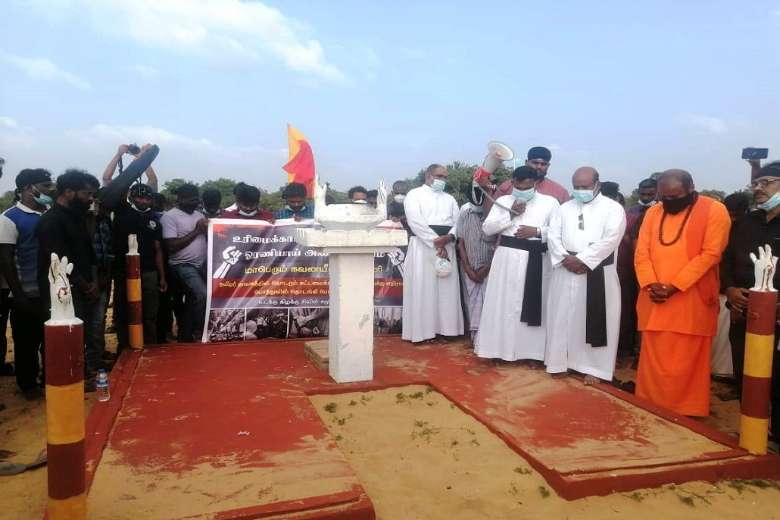Sri Lankan minorities march against oppression, injustice
Church figures join nationwide march seeking justice for Tamils and Muslims
Updated: February 09, 2021 02:12 AM GMT

Religious leaders joined hundreds of Tamils and Muslims in a five-day Walk for Justice to raise key issues facing ethnic and religious minorities in Sri Lanka.
Civil society organizations, religious leaders, political parties, university students, relatives of the missing and rights activists hit the road carrying black flags and banners and chanting slogans against the oppression of minorities as they walked hundreds of kilometers.
The protest march focused on military land grabbing in the north, political prisoners, enforced disappearances, protests against the cremation of Muslims who died of the coronavirus, investigation of war crimes and the release of people falsely arrested after the Easter 2019 terror attacks.
Tamils and Muslims joined the Feb. 3-7 march despite roadblocks, harassment and intimidation from the eastern town of Pothuvil in Batticaloa to the northern town of Polikandi in Point Pedro.
Several Tamil journalists and civil society leaders were issued with stay orders by police to prevent them from participating in the Walk for Justice.
Tamil lawmaker Shanakiyan Rajaputhiran Rasamanickam said they marched to protect the rights of Tamil and Muslim minorities.
“We hope the government will treat all of us as equal citizens of Sri Lanka. Don’t put iron nails on roads and deflate the tires of our vehicles. You can’t stop this protest march by doing such things,” he said.
According to the demonstrators, vehicles traveling with activists were stoned in Trincomalee, while iron nails were left on roads close to a military checkpoint.
Velan Suvamigal, a Hindu priest and a member of the Civil Society Forum, said Tamils and Muslims are fighting for freedom in the country.
“All continue the protest for five days to seek justice for Tamils, Muslims and those who face a lot of challenges and troubles in the country,” he said as the protest march entered the northern city of Mannar on Feb. 6.
Thousands were killed and disappeared during Sri Lanka’s 26-year civil war that ended in 2009 when the army defeated Tamil rebels. Both sides were accused of serious rights violations.
The controversial policy to cremate the bodies of Covid-19 victims has outraged Muslims, for whom cremation is forbidden. Activists say the decision isn’t based on scientific evidence but targets minorities.
Activists demanded the release of Tamil political prisoners who have been jailed for more than 25 years under the Prevention of Terrorism Act and the emergency.
UN High Commissioner for Human Rights Michelle Bachelet has called for member states to consider asset freezes and travel bans on Sri Lankan officials accused of rights abuses.
Father Leo Armstrong, parish priest of St. Fatima’s Church at Iranaipalai in Puthukkudiyiruppu, said they are not against anyone and it was a non-violent protest.
“We are all divided into races, castes, religions and political parties but we have been working together for the last five days to win our rights without any divisions,” he said.
Father Rohan of the Church of the American Ceylon Mission said in the past there was a division between Muslims and Tamils but now Muslims have realized that their fundamental rights have been violated by the government.
“We are happy that the Muslim community has shown solidarity with the march and the fight for the rights of minorities,” he said.
Another Catholic priest said minorities should also have the opportunity to live with dignity in the country.
“Many years have passed since the end of the civil war but justice has not yet been done to the Tamils,” said the priest who wished to remain anonymous.
“Political prisoners have been detained without hearing their cases, hundreds of war widows have no idea what happened to their husbands. Land taken by the military during the war has not yet been returned to rightful owners,” said the priest.
Police spokesman Ajith Rohana said it has been reported that certain groups are carrying out activities on the instructions of foreign groups and the Tamil diaspora.
“The main aim is to destroy the image of our country by posting photos and videos after a confrontation with the police,” said Rohana.
A group of Tamils demonstrated in Mannar and Vavuniya against the five-day protest march.
Courtesy:![]()



